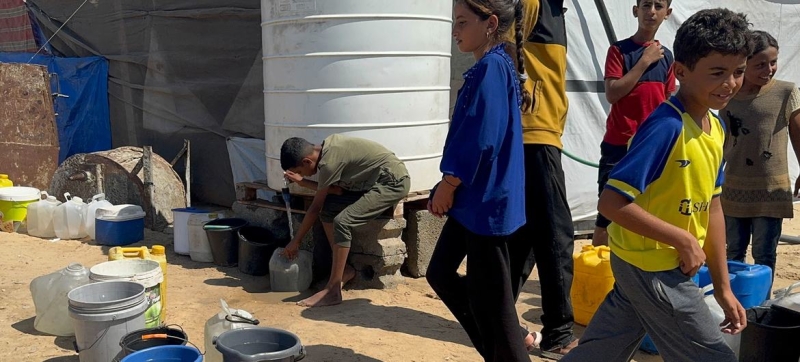
Children came for water in the south of Gaza. Rebuilding Gaza will require $70 billion Humanitarian aid
Rebuilding Gaza and ensuring the safety of the strip’s residents after two years of war will require about $70 billion, UN development experts said Tuesday. Meanwhile, humanitarian agencies report that the amount of aid received remains insufficient compared to the needs of the Palestinians.
Virtually no part of the enclave – just 41 kilometers long and two to five kilometers wide – escaped destruction as a result of constant Israeli bombing. in the enclave “is about 84 percent, and in some areas, such as Gaza City, up to 92 percent.”
20 billion dollars – in the next three years
Speaking from Jerusalem, a UNDP representative noted that, according to A preliminary assessment by the UN, the European Union and the World Bank puts the damage at $70 billion.
To launch a massive reconstruction operation, $20 billion will be needed over the next three years alone, Silje told reporters in Geneva.
UNDP, together with humanitarian partners, is already providing emergency assistance to 2.1 million people in Gaza, including providing them with access to clean water and medicine, helping to find temporary work, clearing garbage and making homes and public spaces safer by clearing them of rubble that could contain unexploded ordnance or missing people. Silje. “The main purpose of the cleanup is to ensure humanitarian organizations have access to the affected areas so they can deliver much-needed aid. We also clean hospitals and other social institutions.”
The UNDP representative noted “very positive signals” from potential donors, including Arab states, European countries and the United States, who have also expressed willingness to participate in the early stages of recovery.
Humanitarian urgency aid
Meanwhile, UN humanitarian agencies again called on Israeli authorities to open all crossings into Gaza after the release of 20 remaining Israeli hostages and a number of Palestinian hostages on Monday prisoners.
This followed the signing of a ceasefire agreement between Hamas and Israel on Monday evening in Sharm el-Sheikh, brokered by US President Donald Trump and the leaders of Egypt, Qatar and Turkey.
On Tuesday, the world community’s attention was focused on the transfer of the bodies of the dead hostages. The process is being led by the International Committee of the Red Cross (ICRC).
“At least we have a home”
Speaking from Gaza, UNICEF worker Tess Ingram spoke of a family affected by war forced to leave their home five times: “I met Mustafa and Saida’s family today, and they told me that they consider themselves lucky because, while removing the rubble from the building, Mustafa said: “At least we have a home.” water carrier.
“But they live in fear that he won’t come today or tomorrow. Saida cannot get the necessary medicine, and her sons had to go a very long way to buy anything to bake bread. Families now need absolutely everything. We need hundreds of aid trucks every day, as promised,” she added.
Population needs
Humanitarian workers report that needs in Gaza remain “huge” and constantly changing, with more than 300 Thousands of Palestinians have been making their way north towards Gaza City since Friday.
“The encouragement we have seen from the international community and people on the ground – the hope that this is the beginning of the end of suffering – is not yet reflected on the ground. We still do not receive enough humanitarian aid,” said UNICEF representative Ricardo Pires.
The Israeli authorities agreed to allow 190 thousand tons of humanitarian aid. UN agencies are ramping up operations, but as representatives of the UN Office for the Coordination of Humanitarian Affairs (OCHA) and partner organizations have repeatedly said, this is still woefully inadequate.
“Of course, we are talking with everyone,” said OCHA spokesman Jens Laerke. “We were also present yesterday in Sharm el-Sheikh, along with 22 heads of state and government, calling on everyone to do everything possible to get this process started as soon as possible.”
Aid agencies say the practice of issuing aid in hard-to-reach areas, including non-UN distribution centers, must be stopped. where hundreds of Palestinians were killed or wounded.
